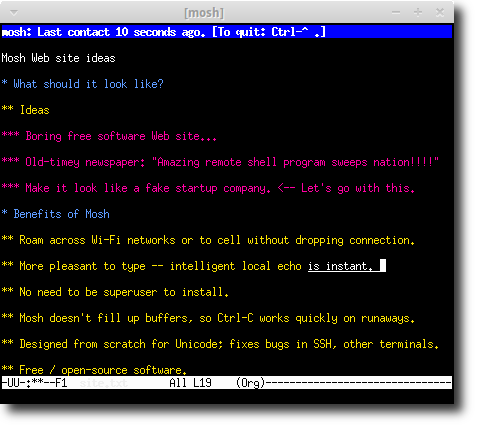132 private links
Password management should be simple and follow Unix philosophy. With pass, each password lives inside of a gpg encrypted file whose filename is the title of the website or resource that requires the password. These encrypted files may be organized into meaningful folder hierarchies, copied from computer to computer, and, in general, manipulated using standard command line file management utilities.
usbrip (inherited from "USB Ripper", not "USB R.I.P.") is an open source forensics tool with CLI interface that lets you keep track of USB device artifacts (i.e., USB event history) on Linux machines.
usbrip is a small piece of software written in pure Python 3 (using some external modules, see Dependencies/pip) which analyzes Linux log data (journalctl output or /var/log/syslog* and /var/log/messages* files, depending on the distro) for constructing USB event history tables. Such tables may contain the following columns: "Connected" (date & time), "Host", "VID" (vendor ID), "PID" (product ID), "Product", "Manufacturer", "Serial Number", "Port" and "Disconnected" (date & time).
Simple password-based file encryption. Contribute to spieglt/Cloaker development by creating an account on GitHub.

Tomb is an 100% free and open source system for file encryption on GNU/Linux. It simply makes gpg dm-crypt and cryptsetup usable in a variety of situations.
Written in bash.
A collection of command-line and GUI tools for capturing and analyzing audio data. The most interesting tool is called keytap - it can guess pressed keyboard keys only by analyzing the audio captured from the computer's microphone.
toplip - "the best place to hide something is right under your nose." toplip is our command line, very strong encryption and decryption utility with optional plausible deniability, image embedding, and multiple/variable passphrase complexity.
Feature Highlights
- Very strong encryption (XTS-AES256 based, possibly cascaded)
- Optional "plausible deniability"
- Optional image embedding/extraction (PNG/JPG)
- Optional multiple passphrase protection
- Simplified brute force recovery protection
- No identifiable output markers
- Open source/GPLv3
- Commercial support/training
Sharing files can be a pain. The larger the file is, the more difficulty it inevitably creates. If you want those files kept private, you're in for a real nightmare. Well, not exactly.
Onionshare is a relatively new application that allows you to share files of any size securely and relatively anonymously over the Tor network without the need for a "midde-man" website. It's completely free and open source, and it's actually easy for anyone to use.
Mobile shell that supports roaming and intelligent local echo. Like SSH secure shell, but allows mobility and more responsive and robust.

zbackup is a globally-deduplicating backup tool, based on the ideas found in rsync. Feed a large .tar into it, and it will store duplicate regions of it only once, then compress and optionally encrypt the result. Feed another .tar file, and it will also re-use any data found in any previous backups. This way only new changes are stored, and as long as the files are not very different, the amount of storage required is very low. Any of the backup files stored previously can be read back in full at any time. The program is format-agnostic, so you can feed virtually any files to it.
This is achieved by sliding a window with a rolling hash over the input at a byte granularity and checking whether the block in focus was ever met already. If a rolling hash matches, an additional full cryptographic hash is calculated to ensure the block is indeed the same. The deduplication happens then.
